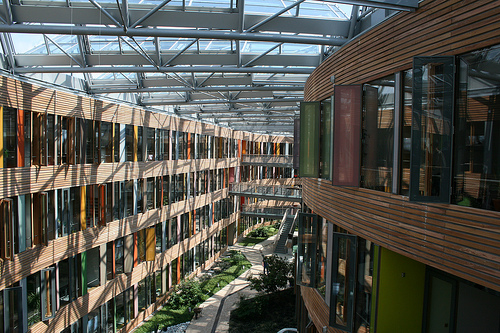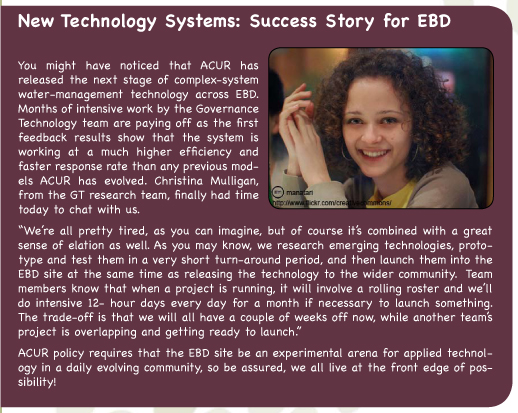ACUR: Australian Centre for Urban Resilience
A collective knowledge hub for the EBD community’s innovation, research and experimentation.
Every district of Melbourne should have an ACUR! In EBD, the centre has transformed old ideas about universities, research AND experimentation. Certainly ACUR has grown over the years with visiting scientists and experts coming from all over the world. For example, it now has laboratory equipment and sensors all over the site. Most systems on the site will have ‘ACUR testing’ signs posted many times a year. Its daily information channel is referred to by most residents and businesses, and it provides a constant program of lectures and seminars which are open to all. Yet ACUR is seen as a community facility, never an ‘ivory tower’ (in spite of its home location in the old railways signaling tower).
ACUR is so ‘open’ that most residents think of it as theirs, and more than 50% of locals have joined one or other of the ACUR research and innovation programs, either as volunteers or as temporary staff.
ACUR treats the site as its ‘research laboratory’, but because of the way that it operates, using a two-way flow of information, open data gathering and communication, it is treated by everyone involved in living and working at EBD as a collective knowledge repository. The evolution of the site, from its design and planning and construction back in 2015 to the present, owes so much to the innovative organisation of collective knowledge that ACUR represents.


Expert knowledge, engineering and social and behavioural skills have been critical in the shaping of the site, but all that knowledge and theory and practice has had to be tested in these conditions and for ‘radical’ ends, and every person on the site has had some role in that experimentation. ACUR ‘spun out’ its tenth new business this year to great celebrations. Last year the ACUR visitors’ centre was re-located to accommodate the ever-increasing public attention.
We are now seeing a big focus on hydrology and horticulture (following last year’s ‘blitz’ on renewable energy and energy efficiency) and there are 12 visiting professors and scientists from China, India, Columbia, USA, Japan, Germany and the Netherlands (bringing the total number of such visitors to a record 135 in this last year). With ACUR’s policy of housing such visitors within the EBD all these 12 women and men are already familiar figures around town. Following their lecture series last month about work in their respective countries, there are already cafe debates about how to take ideas from China (among other places) into our local context. In addition, over 300 post-graduate research students are involved in research at the EBD from one or other of the four universities that established ACUR (Melbourne, Monash, RMIT and Swinburne).